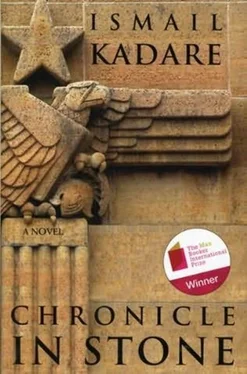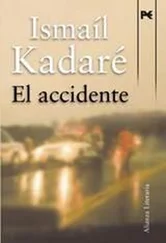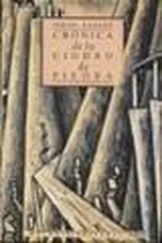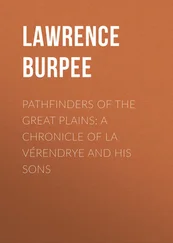Ismaíl Kadaré - Chronicle in Stone
Здесь есть возможность читать онлайн «Ismaíl Kadaré - Chronicle in Stone» весь текст электронной книги совершенно бесплатно (целиком полную версию без сокращений). В некоторых случаях можно слушать аудио, скачать через торрент в формате fb2 и присутствует краткое содержание. Жанр: Современная проза, на английском языке. Описание произведения, (предисловие) а так же отзывы посетителей доступны на портале библиотеки ЛибКат.
- Название:Chronicle in Stone
- Автор:
- Жанр:
- Год:неизвестен
- ISBN:нет данных
- Рейтинг книги:4 / 5. Голосов: 1
-
Избранное:Добавить в избранное
- Отзывы:
-
Ваша оценка:
- 80
- 1
- 2
- 3
- 4
- 5
Chronicle in Stone: краткое содержание, описание и аннотация
Предлагаем к чтению аннотацию, описание, краткое содержание или предисловие (зависит от того, что написал сам автор книги «Chronicle in Stone»). Если вы не нашли необходимую информацию о книге — напишите в комментариях, мы постараемся отыскать её.
Chronicle in Stone — читать онлайн бесплатно полную книгу (весь текст) целиком
Ниже представлен текст книги, разбитый по страницам. Система сохранения места последней прочитанной страницы, позволяет с удобством читать онлайн бесплатно книгу «Chronicle in Stone», без необходимости каждый раз заново искать на чём Вы остановились. Поставьте закладку, и сможете в любой момент перейти на страницу, на которой закончили чтение.
Интервал:
Закладка:
“You hardly ate a thing. You’re not sick, are you?”
“No.”
“Of course you are,” said Grandma. “You’ve caught your death. Sitting on the roof all day as if you had no home.”
I got up without a word and went into the living room. My younger aunt was sitting in the corner reading the newspaper.
I didn’t speak to her. The room was completely quiet. From the top of Citadel Street came the song of the stranger as he made his way down:
The clock struck seven as I came by;
I stood by your window and sighed a sigh
I listened, in a dream… So, towards seven in the evening, someone else was now going past the windows of a house where a girl called Miriam still lived, and who still had headaches.
The voice faded into the distance but before it disappeared altogether the wind brought me an extra part of the story:
Gladly would I fetch the doctor for you
But neighbours would likely take a dim view
But why would the neighbours object? What harm would it do to them? I couldn’t imagine. I wracked my brains to no end, but then I took comfort in recalling that one day, in the great living room, I’d heard it said that what happens in songs isn’t at all like what happens in life.
You could feel autumn coming on. Down below, among the branches losing their leaves, slid a shadow. Suzana. She must have known that I had come.
The tick-tock of the big clock was making a strange sound. Sadness was all around, spreading in great concentric circles through endless space. Soon it would spread out over the whole world.
It was a gloomy lunch. We ate in silence. Everyone seemed to be waiting impatiently for Grandmother to look at the cock’s bones.
In these past days, whenever a rooster was killed in the neighbourhood, everyone was informed right away, because the future could be read in the bones and everyone was expecting something serious to happen.
A week before, Ilir’s mother had sent us all over to Kako Pino’s. “She slaughtered a cock today,” Ilir’s mother had said. “Go on over there, children, and find out how the bones came out.”
We too had slaughtered a cock today. By afternoon people would be knocking at the door to ask about the bones. Grandmother would be asked about them if she went anywhere; my mother would be questioned the moment she stepped out through the gate, and Papa probably at the coffee house. It should be obvious from all this that in our city people did not get to eat chicken very often.
Lunch came to an end. Grandmother picked up the carcass, squinted, and stared hard at it, turning it this way and that, holding one side and then the other up to the light. We all waited in silence.
“War,” Grandmother said suddenly in a muffled voice. “The edges of the carina are red. War and blood.” She pointed to the places on the breastbone that foretold war.
No one spoke.
Grandmother kept looking at the bone.
“War,” she repeated, putting her left hand on my head as if to protect me from some scourge.
After lunch I went back to the pile of dirty dishes to look for the bone. I took it up the two flights to the main room, where I sat alone at the high windows and began a careful examination of that tragic bone. It was an October afternoon. A dry wind was blowing. I stared at the cold bone I held in my hand. It was reddish, shading into violet. Sometimes it seemed splattered with little drops of blood, sometimes it blazed with the reflections of a great fire.
Gradually it turned completely red, its back now covered no longer with little drops of blood but with whole streams rushing down the slopes, turning everything in their path red.
As I fell asleep with the bone in my hand, I saw the flames blazing on its side once more. Then, as if through a wall of smoke, I heard the first drums of war.
I could feel it the moment I entered the courtyard: Margarita was gone. I didn’t ask what had happened. The street was deserted and the courtyard trees were losing their leaves, which fluttered lazily onto the roof of the shack where the gypsies lived. I felt sad.
The autumn rains would start soon. The trees would be completely bare, and the wind would howl through the eaves. The roof would leak in the places I had sat in the summer, and in the old attic, the box of tobacco, the matches and the Turkish book would rot away.
Suzana would flutter about in the air somewhere and never find out what had happened to a man called Macbeth in distant Scotland. I wouldn’t have been surprised if the next time I came they had told me that she’d flown off with the storks.
On winter nights the hordes of mice would rage up and down in the attic. Fight on, Genghis Khan. Crush everything in your path. No one sleeps below Asia any more. It’s just a desert.
FRAGMENT OF A CHRONICLE
his declaration. During the Polish campaign I never ordered a night-time air raid, Adolf Hitler claims. I bombed the country by day. I did the same in Norway, Belgium and France. Then suddenly Mr Churchill bombed Germany at night. You know how patient I am, Comrades. I waited a week. He bombed again. This man is mad, I said to myself. I waited two weeks. Many people came to me and said, “Führer, how much longer do we have to stand for this?” Then I gave the order to bomb England by night. Trial. Executive measures. Property. One hundred and twenty-seventh session. Angoni vs Karllashi. The chronicler Xivo Gavo refused to assist in clarifying the matter of the old land titles. Our fellow citizen the inventor Dino Çiço is preparing to leave on a trip to Hamburg. We take the opportunity to protest indignantly at an article in a Tirana newspaper headlined “World War Imminent. Mad Inventor Claims Creation of Device to Protect Town”. Yesterday our fellow citizen T.V. drank thirty cups of coffee in a row. I order a blackout in the city. Garrison Commander Bruno Arcivocale. Na-
SIX
I was coming home from Grandfather’s. I had stayed longer than usual because this was to be my last visit of the year. In the winter hardly anyone went to see him because the weather was too bad and the place was battered by the wind from all directions. Only my father would sometimes venture out into that wasteland to borrow a little money.
As soon as I came into the house, I could tell that something had changed. Mamma and Grandmother were darning an old blanket. Nazo’s daughter-in-law was helping.
“What are you doing?” I asked.
“We have to cover the windows at night,” Grandmother said. “Government orders.”
“What for?”
“In case of bombing. Didn’t they tell you about it over there?”
I shrugged.
“No, I don’t know anything about it.”
“They went from house to house announcing it,” Grandmother said.
Someone knocked furiously at the door.
“Xhexho,” Mamma said.
It was indeed Aunt Xhexho, and she was already halfway up the stairs.
“How are you, ladies?” she said, out of breath from her climb. “Sewing curtains? God, what a disaster. What next? To have to cover the house like a tomb. Harilla Lluka has been going from door to door since this morning. ‘Darkness’, he says, ‘Let there be darkness.’”
“Compulsory blackout,” said Nazo’s daughter-in-law without raising her eyes from the blanket. “That’s what it’s called.”
“May they be struck blind!” Xhexho exclaimed. “May their eyes go as dim as Vehip Qorri’s!”
I didn’t understand who Xhexho was cursing or why.
There was another knock at the door. It was Kako Pino and Nazo.
Читать дальшеИнтервал:
Закладка:
Похожие книги на «Chronicle in Stone»
Представляем Вашему вниманию похожие книги на «Chronicle in Stone» списком для выбора. Мы отобрали схожую по названию и смыслу литературу в надежде предоставить читателям больше вариантов отыскать новые, интересные, ещё непрочитанные произведения.
Обсуждение, отзывы о книге «Chronicle in Stone» и просто собственные мнения читателей. Оставьте ваши комментарии, напишите, что Вы думаете о произведении, его смысле или главных героях. Укажите что конкретно понравилось, а что нет, и почему Вы так считаете.












